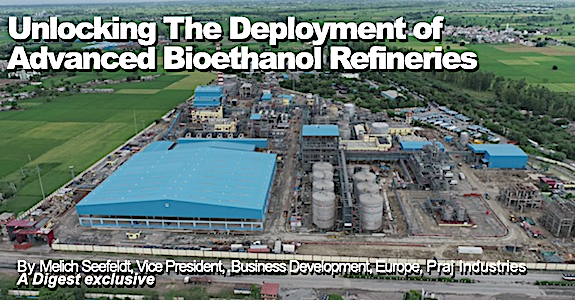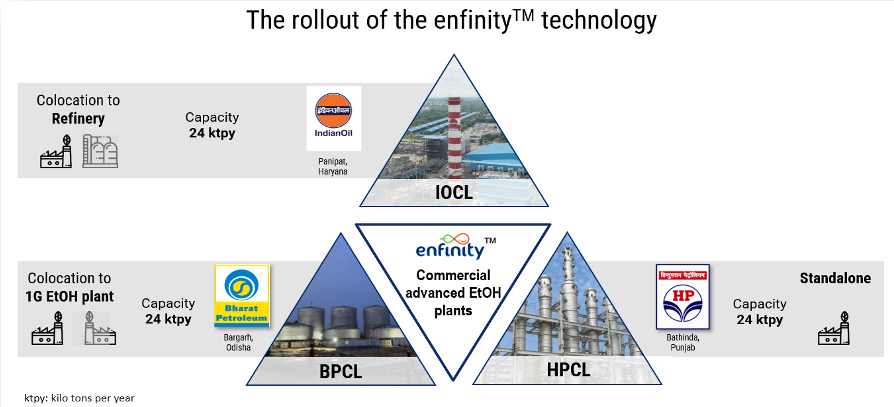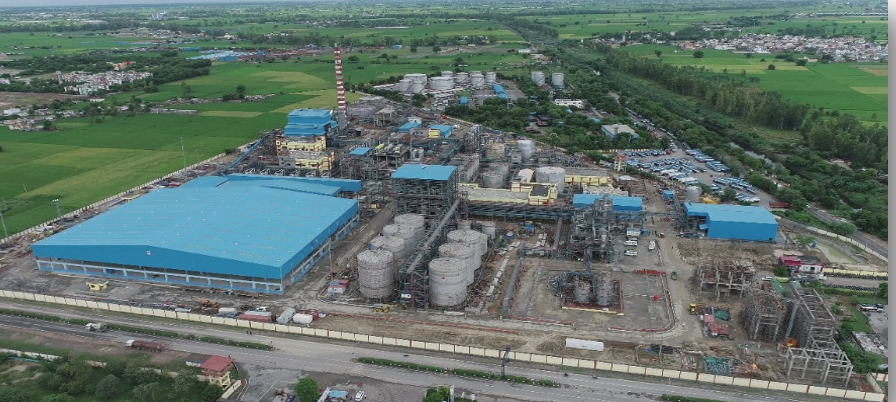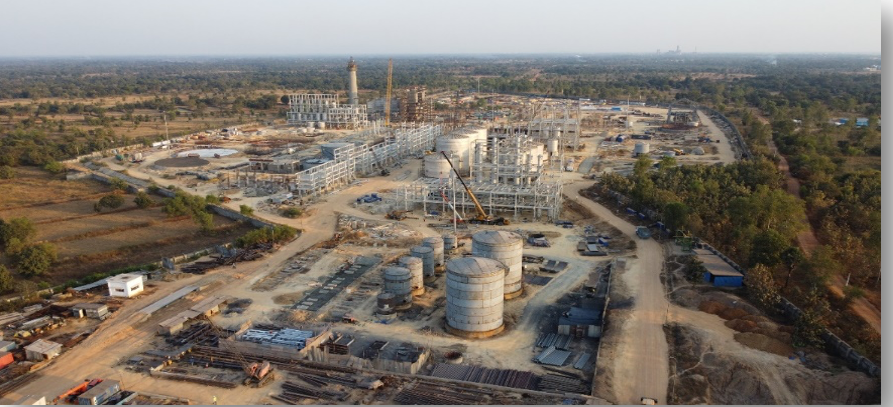Unlocking The Deployment of Advanced Bioethanol Refineries

Their significant role as potential carbon-neutral pathways for the transport sector is mirrored in the target architecture of several policy frameworks, for example in the new Renewable Energy Directive (RED III) in Europe. As drop-in fuel, advanced bioethanol allows for fast and scalable uptake, not needing any engine or infrastructure modifications.
If governments and industries around the world recognize advanced bioethanol as being so powerful to replace fossil fuels, why has its production not been ramped-up yet?
-
Facing the “chicken or egg” quandary – What’s the first policy or large-scale deployment?
Decarbonization comes at a cost. The deployment of scaled-up technologies requires clear policy support creating a predictable and stable demand – revenue certainty. At the same time, the establishment of policy support requires ready-to-scale-up technologies – the de-risked technology. It is a long cycle for groundbreaking renewable technologies to establish – many of them never do.
-
The continuum is breaking – The policy is in place
In Europe, the Parliament and the Council strengthened their Renewable Energy Directive (RED III). They were setting ambitious targets for advanced bioethanol by introducing a binding combined sub-target of 5.5% in 2030 for advanced biofuels and renewable fuels of non-biological origin. The agreement also aims for easier and faster permitting procedures for renewable energy projects and promotes cross-border cooperation on renewables. Strong investment signals are sent to the evolving European advanced biofuels market. The blending mandate creates a secure demand for investors, lenders, and project developers to implement commercial projects. Revenue certainly is critical for the market ramp-up.
Beyond the use of advanced bioethanol as a drop-in fuel, its wider demand is forecasted for the biochemical and biomaterial sectors. The continuous expansion is driven by customer awareness, net zero commitments, Scope 3 reporting, et al. In 2030 a significant supply-demand gap of over 8.4 Mtpy biochemicals and materials is forecasted in the EU.i On top of it the global SAF capacity built-up is gaining strong momentum. After 2030 the SAF growth in Europe will originate, besides from Power to Liquid (PtL), from advanced bioethanol-based Alcohol to Jet fuel (ATJ).
The supply-demand gaps of the three target market segments are accumulating in different phases in the next years and are resulting in attractive off-take contracts for advanced biofuels.
The EU policy targets are set. What about the readiness of scaled-up technology?
-
“Go big or go home” – deployed commercial advanced bioethanol technology
Two large-scale advanced bioethanol plants based on Praj Industries’ licensed “enfinity” technology are under construction in India. A third one is under commissioning. “enfinity” is Praj Industries’ proprietary, proven technology to responsibly produce sustainable advanced bioethanol from cellulosic biomass like agricultural residues, energy crops, or hard wood.
Each of the commercial facilities uses rice straw as a feedstock and has a production capacity of 24000 tons per year of advanced bioethanol. In addition, the portfolio of sustainable products consists of (1) lignin, (2) thin stillage, and (3) biogenic CO2 to be captured and liquified. Beyond rice straw “enfinity” can process further agricultural residues like wheat straw, corn stover, bagasse, et al.
The licensees and investors are three global Fortune 500 energy companies – the Indian Oil Corporation Limited (IOCL), Bharat Petroleum Corporation Limited (BPCL), and Hindustan Petroleum Corporation Limited (HPCL). They are first movers, forming the backbone of a sustainable advanced bioethanol economy.

IOCL Plant
It is co-located with its oil refinery in Panipat. Indian Prime Minister inaugurated it during World Biofuel Day in August 2022. The fuel-grade advanced bioethanol will be delivered over the fence and blended into the gasoline. (Praj’s advanced ethanol plant at IOCL, Panipat)
Praj Industries executes a broad scope of this project. It licenses the “enfinity” technology, performs the basic engineering design packaging, and delivers proprietary equipment and licensors services. In this specific Indian project, Praj Industries acts as the EPCM contractor for the inside and outside battery limits and will supervise the operations of the plant for a foreseeable time.

HPCL Plant
HPCL is an S&P Global Platts Top 250 Global Energy Company. They own the 2nd largest fuel product pipeline in India with more than 3015 km. Their advanced bioethanol facility is a greenfield standalone plant. It contributes by adding bioethanol to their gasoline. From 2021 to 2022 HPCL blended 950 Mio. liters of ethanol in motor spirit. Praj licenses “enfinity” technology, performs the basic engineering design packaging, and delivers proprietary equipment and licensors services.
BPCL Plant
It is an integrated conventional (1G) and advanced bioethanol (2G) refinery. The industrial complex will produce ≈24.000 tons per year of advanced and ≈24.000 tons per year of conventional fuel grade ethanol. The co-products additionally include DDGS. The 1G plant uses damaged grains as feedstock, which – in this case – is broken rice outside of the food chain.
The facility is designed by Praj Industries’ multi-disciplinary engineering teams to reach multiple 2-digit millions of CAPEX cost synergies by integrating/co-locating a 1G and a 2G bioethanol plant.

All three commercial plants use Zero-liquid discharge technology of Praj Industries. It is a water treatment process in which all wastewater is purified and recycled, therefore leaving zero discharge at the end of the treatment cycle.
Learning-by-doing – The key to opening the treasure vaults of advanced bioethanol
Investors seek certainty in the return of their investments in advanced biorefineries. They expect the implementation of the (1) planned project realization time, (2) CAPEX, (3) OPEX, and (4) designed production capacity – ideally backed by performance guarantees. All those factors shall be attractive in comparison to their competing technologies. Developing innovative biotechnology from a scaled-up first-of-its-kind plant level to become a de-risked and profitable investment requires deployment-induced learnings from the execution of multiple projects.
Praj Industries is rolling out its “enfinity” technology. The three fully integrated, licensed industrial facilities are nine to twelve months apart from each other in commissioning time. They enable an unparalleled improvement and de-risking process including the following lessons learning:
- Acceleration in construction & plant startup times. Reduction of unanticipated issues.
- CAPEX reduction by
- Optimized plant configuration for inside and outside battery limits.
- In-house modularization & replication from one project to another.
- Value engineering of Praj Industries’ proprietary critical equipment to minimum technical solutions.
- OPEX reduction by process optimization to increase plant performance in operating reliability and capacity as well as in conversion yields.
Economies of scale by expanding the production capacities of “enfinity” biorefineries to 50000 tons per year of advanced ethanol or larger will drive additional cost reductions. A plant location within or co-located with an existing industrial facility like an oil refinery, a 1G ethanol plant, a pulp and paper plant, etc. can increase the project profitability extra by repurposing existing assets. Praj Industries’ modularization business line CPES will contribute significant savings on project realization time, delivering most of the plant in skid-built units. Depending on the project the on-site construction and assembly time can be saved up to 80% to keep pace with the anticipated growth expectations.
Conclusion
The urgency to invest in advanced bioethanol projects is greater than ever. Especially the binding blending mandate for advanced biofuels in the Renewable Energy Directive III in Europe initiates a secured demand in 2030 and beyond. Praj Industries proven technology “enfinity” is rolled out and commercialized. Two of its large-scale plants are under construction, the third one is commissioning in overlapping times. It is not only steel in the ground. The execution of multiple projects results in significant learning and de-risking. The cycle of what comes first, the supporting policy or the deployment of commercial-scale facilities is breaking, driving the early buildup of the global advanced bioethanol market.
About the Author
 Melich is Praj’s Vice President of Business Development in Europe. He represents the business lines 1G & Advanced Bioenergy, Hi Purity for sterile Biotech plants, Critical Process Equipment and Process Plant Modularization. His heart beats Bio. Melich brings over 20 years of global experience in general contracting, project development of biorefineries as well as experience in the on- and off-site enzyme business, having commercialized groundbreaking biotechnologies. Previous he has been the Director of EU Business Development for 1G & 2G biofuels at Novozymes in Copenhagen. Before the Head of global Business Development of advanced Biofuels & Derivatives at Clariant in Munich. Earlier Melich has developed >250 Mio. EUR bioethanol plants for the Ferrostaal group in São Paulo. He has been a member of the Programming Core Team of the Biobased Industries Consortium (BIC) in Brussels and authored several books and articles on Project Management, Plant Engineering and Biofuels.
Melich is Praj’s Vice President of Business Development in Europe. He represents the business lines 1G & Advanced Bioenergy, Hi Purity for sterile Biotech plants, Critical Process Equipment and Process Plant Modularization. His heart beats Bio. Melich brings over 20 years of global experience in general contracting, project development of biorefineries as well as experience in the on- and off-site enzyme business, having commercialized groundbreaking biotechnologies. Previous he has been the Director of EU Business Development for 1G & 2G biofuels at Novozymes in Copenhagen. Before the Head of global Business Development of advanced Biofuels & Derivatives at Clariant in Munich. Earlier Melich has developed >250 Mio. EUR bioethanol plants for the Ferrostaal group in São Paulo. He has been a member of the Programming Core Team of the Biobased Industries Consortium (BIC) in Brussels and authored several books and articles on Project Management, Plant Engineering and Biofuels.
Category: Top Stories















